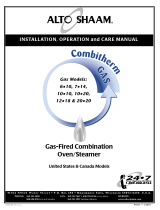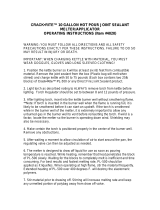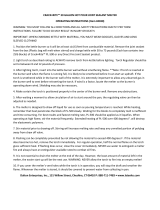
INFRARED CHEESE MELTER CLEANING & MAINTENANCE
OWNER’S MANUAL 1186531 REV 2 (09/11) PAGE 11 OF 24
CLEANING & MAINTENANCE
WARNING
Shut off the gas supply to the appliance before cleaning or performing maintenance on any gas appliance.
The appliance may be equipped with a restraint device to limit its movement in order to prevent damage to the
gas connection. If disconnection of this restraint is necessary to move the appliance for cleaning or
maintenance, reconnect the restraint when the appliance is moved back to its original installed position.
Southbend appliances are sturdily constructed of the best materials and are designed to provide durable service when
treated with ordinary care. To expect the best performance, your equipment must be maintained in good condition and
cleaned daily. Naturally, the periods for this care and cleaning depend on the amount and degree of usage.
Following daily and periodic maintenance procedures will enhance long life for your equipment. Climatic conditions
(such as salt air) may require more thorough and frequent cleaning or the life of the equipment could be adversely
affected.
Keep exposed, cleanable areas clean at all times.
DAILY CLEANING AND MAINTENANCE
To prevent excess smoking, the cheese melter grid, bottom drip pan, and the other cheese melter components must
be kept clean of food remnants. Use a wire brush or similar scraping utensil. DO NOT use steel wool or a similar
scrub pad that will leave small particles, which can get into food. The daily cleaning procedure is as follows:
1. Turn all controls to OFF, shut off the gas supply, and allow time for the cheese melter to cool.
2. Pull out the cheese melter rack and clean it.
3. Remove the bottom drip pan and clean it.
4. Check that nothing has been placed on top of the cheese melter (which will block the escape of combustion
exhaust).
5. Check that the air-intake openings on the rear of the cheese melter are not obstructed.
6. Turn on gas supply, check that all controls are turned to OFF, and light the pilots.
MONTHLY CLEANING AND MAINTENANCE
The following tasks should be performed monthly:
1. Check for proper pilot operation. The flame on each pilot should be just large enough to extend along the flame
carrier to the burner surface. If adjustment is necessary, call for service.
2. Check for proper burner operation. When the burner control is set to HIGH, the ceramics should glow red and the
flame on the surface of the ceramics should be barely visible, with little or no blue haze. When the burner control
is set to LOW, the surface of the ceramics should glow very dull red and the flame should have a blue-haze
color. The flame should not flutter or “pop.” If adjustment is necessary, call for service.
SEMIANNUAL CLEANING AND MAINTENANCE
At least twice a year the venting system should be examined and cleaned.
STAINLESS-STEEL SURFACES
To remove normal dirt, grease and product residue from stainless steel surfaces that operate at LOW temperature,
use ordinary soap and water (with or without detergent) applied with a sponge or cloth. Dry thoroughly with a clean
cloth.
To remove BAKED-ON grease and food splatter, or condensed vapors; apply cleanser to a damp cloth or sponge and
rub cleanser on the metal in the direction of the polishing lines on the metal. Rubbing cleanser, as gently as possible,
in the direction of the polished lines will not mar the finish of the stainless steel. NEVER RUB WITH A CIRCULAR
MOTION. Soil and burnt deposits which do not respond to the above procedure can usually be removed by rubbing
the surface with SCOTCH-BRITE scouring pads or STAINLESS scouring pads. DO NOT USE ORDINARY STEEL























